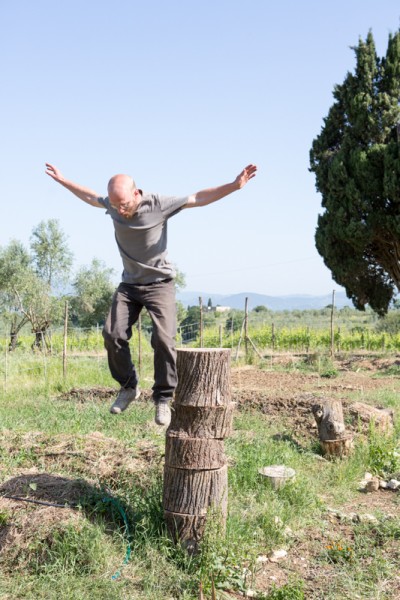






































ITA
“Mondeggi Bene Comune Fattoria Senza Padroni” è la più vasta occupazione
di terre in corso in Italia. Siamo nelle splendide colline del
Chianti fiorentino, 200 ettari, 12.000 olivi, vigne, seminativi, 8 grandi
case coloniche e una imponente villa rinascimentale.
L’occupazione è cominciata nel giugno 2014 con il supporto del movimento
contadino “Genuino Clandestino”, per opporsi alla vendita
delle terre.
Sotto la pressione della cosidetta “Troika” nel 2011-2012 il Governo
italiano varò con urgenza alcune leggi per tagliare la spesa pubblica.
Alcune di queste (L.183/2011 and L.201/2011 ‘Salva Italia’) hanno
reso 320.000 ha di terre agricole pubbliche vendibili a privati autorizzati
a cambiarne la destinazione d’uso dopo 5 anni.
La tenuta di Mondeggi è di proprietà della città metropolitana di
Firenze ed è in vendita. Nel 2009 l’azienda agricola di proprietà pubblica
che gestiva i terreni è fallita lasciando oltre 1 milione di euro di
debito.
Le persone coinvolte direttamente nell’occupazione sono un centinaio.
Una parte più piccola di esse si è trasferita a vivere nei terreni
occupando due case coloniche e lavorando quotidianamente la terra.
Sono i più giovani che di fronte alla disoccupazione giovanile così
alta (sopra il 40%) decidono di tornare al lavoro agricolo. Molti sono
agronomi, altri sono laureati in discipline umanistiche o economiche.
Il Comitato non usa il termine “occupazione” ma parla di “presidio
contadino” e “custodia” del bene, le persone si ritengono infatti custodi
di un bene pubblico.
Mondeggi Bene Comune è una “protesta produttiva” gli ortaggi, il
pane e l’olio biologici sono venduti in 7 mercati contadini e in oltre
60 gruppi d’acquisto, contribuendo a costruire una rete alternativa di
distribuzione del cibo a Firenze.
ENG
(Land common good: the land is a common resource)
A new season of land occupation in Italy. The experience of Mondeggi
Common Good, the larger land occupation in Italy since the
1980s.
Mondeggi Common Good, based on the wonderful Tuscan Chianti
hills, is the most successfull and long-lasting initiative of the national
campaing.
When we hear news about occupation of lands we think that they come from
South America or other sites where peasant movements are significant.
With this reportage I’m instead describing the larger land occupation in
Italy. It is 200 hectares (500 acres), 12,000 olive trees, vineyards, arable lands,
8 large farmhouses and an imposing Renaissance Villa. This occupation is
called “Mondeggi bene comune, fattoria senza padroni” (Mondeggi common
good, farm without owners) and began in June 2014.
Under the pressure of the so-called ‘Troika’, in 2011-2012 Italian Government
adopted some urgent laws in order to cut public spending. Some of
these (L.183/2011 and L.201/2011 ‘Salva Italia’) made 320.000 ha public agricultural
lands saleable to private actors who would have been authorized to
change destination after 5 five years.
Civil society strongly opposed. The rising Genuin Clandestine network
- mainly composed by small and marginal agricultural producers - launched
the national protest campaing ‘Terra Bene Comune’ (‘Land Common
Good’). There are about 200 actively partecipating people, divided into working
groups or other projects. Younger people have moved to live in the farm
occupying two farmhouses and working every day the land. They are young
unemployed WHO, facing the very high Italian youth unemployment
(over 40%), DECIDED to return to rural work. Many are agronomists,
and the others are graduates in human subjects and ECONOMICS WHO
have not found a suitable job IN THE ITALIAN LABOUR market.
The estate of Mondeggi is public property. It is partially abandoned since
2009 after the public farm failed, leaving a debt of more than 1 million euro.
Now it’s for sale.
The Committee does not use the term “occupation” but speaks of “safeguard
farmer” and “custody” of the commons.
Mondeggi Common Good is a “productive protest”: the organic vegetables
and olive oil are sold in the Florentine area through 7 community peasant
markets and over 60 solidarity purchase groups. These are building an alternative
food community network in Florence.
